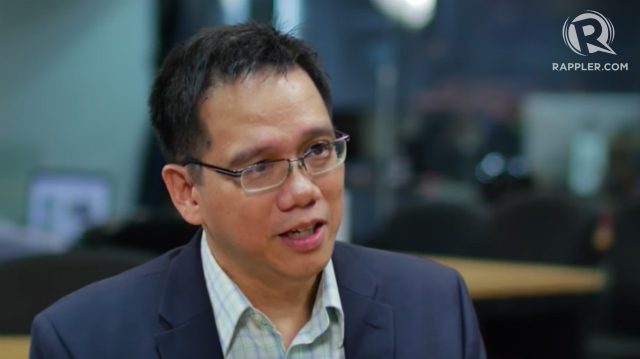SUMMARY
This is AI generated summarization, which may have errors. For context, always refer to the full article.

MANILA, Philippines – While the current political atmosphere may not lead to investors pulling out, it may affect the decision of people with long-term plans to do business in the Philippines.
Risk consultant Roberto “Bob” Herrera-Lim, managing director for Southeast Asia of Teneo Intelligence, said the impact of recent controversial events will be felt in the long run.
“In the immediate future, I don’t think it really affects the flow of investment and money into the economy,” he said in an interview with Rappler editor-at-large Marites Vitug.
“But if you are an investor and you’re looking over the longer term, like let’s say you’re building a large manufacturing facility or you’re investing for the next 20 to 25 years, one of the things you look for is how stable is the legal system,” he added.
Among the issues facing the Philippines are the recent ouster of Chief Justice Maria Lourdes Sereno which many called an attempt to undermine judicial independence and a disregard of the 1987 Constitution, the bloody anti-drug campaign, and attacks on the media.
According to Lim, big businesses are looking for a legal system that is “immune or at least appears to be immune” from political pressure.
“It’s a check mark that says they are not too sure about long-term stability of rule of law in the Philippines,” he said.
Losing ‘better’ investments
It would be a mistake to see Sereno’s ouster as an isolated case, said Lim, noting the perception that the position of chief justice “has been politicized” for so long.
Former president Gloria Macapagal Arroyo’s midnight appointment of Renato Corona, Corona’s eventual impeachment, and former president Benigno Aquino III’s appointment of Sereno led to the notion that the Supreme Court (SC) has been entangled in politics. (READ: [OPINION] [Aftershocks in the Supreme Court)
This is why the perception of the Philippines “has been degrading” since the early 2000s, according to Lim, and this might be the reason why the country is only getting what is called “low capital investment.”
In a nutshell, Lim describes low capital investors as “companies abroad coming in, renting a space, some of them maybe rent for the longer term, but it’s basically renting a space” like business process outsourcing (BPO) companies.
While the Philippines is not going to lose all investments, it is not getting long-term investments such as car manufacturing facilities, for example.
“We are losing out on that kind of investment,” Lim said.
“I think it’s exaggerated to say no investor will now come to the Philippines, but for the investors who care about the longer term, about stability of rule of law, this is… a negative,” he added.
Start dialogue but insulate institutions
The problem of instability is not unique to the Philippines. But what sets the country apart is that other Southeast Asian countries like Thailand – which has been unstable for so long – is that they have been able to insulate bureaucracy and institutions from politics, according to Lim.
“How do we insulate our institutions from politics? The Supreme Court is the institution that is supposed to resolve disputes, so we have to insulate it from politics,” he said.
“Unfortunately, with what has happened over the past 15, 20 years, starting with maybe as far back as the impeachment of [former president Joseph] Estrada, the perception of the Supreme Court being insulated from politics has degraded.”
Lim suggested that the Duterte administration start a dialogue that would pave the way for more understanding and less conflict.
“Calling each other names doesn’t help the country and it filters into this whole story of perception of what’s happening in the country,” he said.
“We must learn from the lessons of other countries. There are a lot of parallels and for us, we have to look outside where we are and see how these other countries solved these problems.” – Rappler.com
Add a comment
How does this make you feel?
There are no comments yet. Add your comment to start the conversation.